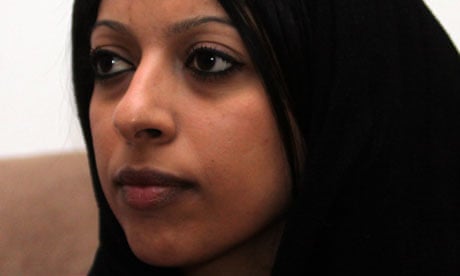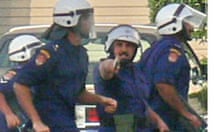A Bahraini woman who witnessed her father, a well-known human rights activist, being seized by masked soldiers, beaten unconscious and then taken into custody, has told the Guardian that she is willing to die on hunger strike unless he is released.
Zainab al-Khawaja, 27, will today enter her fourth day without food in protest at the violent arrest and subsequent disappearance of the outspoken dissident Abdulhadi al-Khawaja, 50, along with her husband and brother-in-law.
Zainab, who was brought up in exile in Denmark, is taking only water, and told the Guardian she is already feeling weak, with breast-feeding sapping her strength faster than she had expected. She says she will leave her 18-month-old child with family members if she dies.
Around a dozen masked and heavily armed soldiers, apparently from Bahrain's special forces, stormed her apartment in the capital, Manama, at 2am on Saturday. Her father had previously called for Bahrain's king to face trial for murder, torture and corruption.
The family's attempts to find out from the police what has happened to the men have failed and they fear they are being tortured. Zainab, who started her fast on Monday, said she now dreams about her father's fate.
"I am willing to go all the way," she said. "Either they come out or I will not eat. I don't care where it ends up."
Asked whether she was willing to die, she replied: "Yes. It is difficult with a child but I am willing to make that sacrifice. My daughter has great aunts and grandmothers who will look after her if anything happens to me … We have the feeling that sacrifices are necessary to bring changes to our country, but what is making it harder is the way the world is reacting. Still the US administration is standing with the dictator here."
Her threat to take her own life came amid signs that the Bahraini regime is toughening its stance against pro-democracy activists. Yesterday was the funeral of the third protester to die in police custody this month. Chanting mourners in Manama pulled the burial cloth off Kareem Fakhrawi, a member of Wifaq, a leading Shia opposition group, to reveal a puncture wound to his neck, extensive bruising across his upper arms, sides and abdomen, and lesions around his lower leg and ankle.
Zainab is documenting her starvation on her Twitter account under
the name angryarabiya. On the site she explains: "I love democracy &
freedom. Therefore, I hate Arab dictators, and American neo-colonialism. Wanna know why Arabs are angry, I'll tell u." More than 8,000 people have signed up to follow her.
Human Rights Watch yesterday called on Bahrain's public prosecutor to investigate deaths in custody reported since 3 April, citing "signs of horrific abuse" on the body of Ali Isa Ibrahim Saqer, who died after turning himself in to the police, who had threatened to detain members of his family if he did not.
The authorities alleged he had tried to run a policeman over in a car during an anti-government protest. The interior ministry issued a statement published in Bahrain newspapers saying that he had "created chaos" in a detention centre "which led security forces to bring the situation under control".
The ministry attributed the death in custody of Zakariya Rashid Hassan, 40, arrested on charges of calling for the overthrow of the regime, to "sickle cell anaemia complications" despite his brother showing Human Rights Watch a photo he said he took during pre-burial cleansing which showed a wound on his right shoulder, a gash on his nose and blood that had issued from his ears and lips.
"If those responsible are not stopped soon the number of dead in custody will exceed those killed during the protest," the Bahrain Centre for Human Rights warned yesterday.
A coalition of 19 Middle Eastern human rights organisations also condemned Bahrain's latest crackdown and warned that Abdulhadi al-Khawaja "is at great risk of being subjected to additional torture and ill-treatment while being detained incommunicado".
The government remains defiant in the face of allegations that they are violating human rights, and Khalid al-Khalifa, Bahrain's foreign minister, posted on Twitter that al-Khawaja "is not a reformer … he called for the overthrow of the legitimate regime … he violently resisted the arrest and had to be subdued". In an account of the raid posted on her website, Zainab al-Khawaja described how her father was "grabbed by the neck, dragged down a flight of stairs and then beaten unconscious in front of me".
"He never raised his hand to resist them, and the only words he said were: 'I can't breathe,'" she wrote. "Even after he was unconscious, the masked men kept kicking and beating him while cursing and saying that they were going to kill him."
She said the special forces also beat up her husband, Wafi Almajed, and her brother-in-law, Hussein Ahmed, but their focus was on her father, who they repeatedly called "the target" during the raid. She is also demanding the release of her uncle, Salah al-Khawaja, arrested three weeks ago.
Zainab said yesterday: "Before they arrested people you thought, yes, they may be tortured, but you will see them again. Now you can't be sure."
She added that the spate of deaths in custody appears to be a deliberate government tactic to increase fear among dissidents. "The government seems to be proud of this because they are the ones announcing the deaths."
"It's outrageous and cruel that people are taken off to detention and the families hear nothing until the body shows up with signs of abuse," said Joe Stork, deputy Middle East director at Human Rights Watch. "The authorities need to explain why this is happening, put a stop to it, and hold anyone responsible to account."
Amnesty International estimates the government is holding more than 400 activists over protests that began on 14 February. The Bahrain Centre for Human Rights said the number is more than 600.


